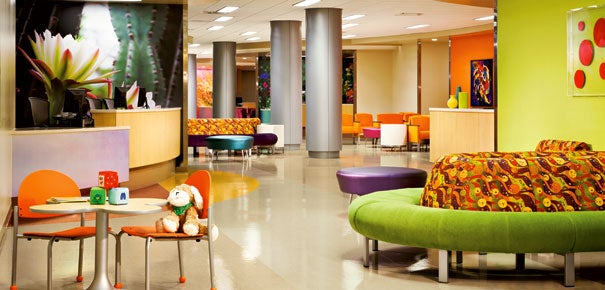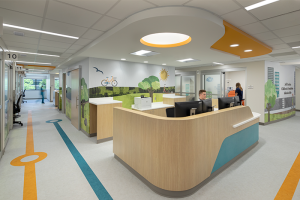Sustainable foundation
Sustainable flooring can be the foundation for environmentally responsible practices at a health facility.
"We really think about the sustainable aspects of our products," says Amy A. Costello, PE, LEED AP, sustainability manager, commercial flooring, Armstrong World Industries Inc. (www.armstrong.com), Lancaster, Pa. The company's linoleum flooring is composed of the same natural ingredients the firm used in the early 1900s, including linseed oil, wood powder and jute backing. The product is 100 percent bio-based, with 35 percent pre-consumer recycled content and 36 percent rapidly renewable raw materials. Armstrong also manufactures bio-based tile; the Striations line is made from 85 percent limestone, 10 percent pre-consumer recycled content and bio-based binder.
The company's commercial floors and adhesives are certified for emitting low volatile organic compounds by SCS Global Services, Emeryville, Calif., through the FloorScore indoor air-quality certification program. Environmental product declarations (EPDs), third-party assessments of the environmental impact of a product over its life cycle, are included on the Armstrong website.
 |
| Armstrong’s Marmorette linoleum, Migrations biobased tile and Medintech homogeneous sheet provide a colorful and sustainable environment, shown here at Phoenix Children’s Hospital. Photo by Blake Marvin/HKS Inc., provided by Armstrong |
The company operates a national reclamation program for vinyl composite tile (VCT) flooring. Armstrong provides the freight to collect its own or other qualifying manufacturers' VCT products, with or without adhesive, and recycles the material into new VCT. A benefits calculator on the Armstrong website can help to determine the carbon and cost savings for a particular reclamation project, based on landfill avoidance, reuse of materials, labor expenses and landfill, dumpster and pallet fees.
Strong and sustainable
Marmoleum sheet and tile linoleum products, by Forbo Flooring Systems (www.forboflooringna.com), Hazleton, Pa., are naturally antistatic, naturally antimicrobial and 100 percent bio-based. According to Denis Darragh, general manager, Forbo North America, the company even works on environmentally responsible agricultural initiatives with farmers who supply materials for its flooring.
Marmoleum products can be cleaned with a dust mop or damp mop and neutral detergent, and the Topshield 2 occupancy-ready finish can be renewed to its original appearance after years of heavy health care use. "You can renew it; you don't have to replace it," explains Darragh, noting that durability is essential to sustainability. The renewable finish can extend the flooring's service life to 30 years, Darragh says. The company also offers a floor base that includes no lead or heavy metals and passes strict indoor air-quality standards.
The Forbo North America website provides access to a number of environmental resources, including EPDs with ecotoxicity and human health impact information for all Forbo products. Full transparency in this area is important to the company because "health is part of the sustainability discussion," Darragh says. The company and its products have met the standards to earn environmental quality labels from the Netherlands, Scandinavia, Austria, Germany, Australia, New Zealand and the United States.
With North American headquarters in Salem, N.H., nora systems Inc. (www.nora.com/us) develops, produces and markets resilient rubber floors. The company has earned Germany's Blue Angel environmental label for its products' carcinogenic-free content and emissions. The flooring also has achieved Greenguard Gold certification from UL Environment, a business unit of Underwriters Laboratories, Northbrook, Ill., that identifies interior products that have low chemical emissions. Greenguard Gold certification demonstrates that the flooring meets the strictest indoor air-quality standards for sensitive people, like children and the elderly, explains Carol Fudge, LEED AP, marketing research specialist, nora.
The natural and synthetic rubber used to manufacture nora floors is purchased from suppliers who are certified by the International Organization for Standardization, Geneva, to meet environmental and quality management standards (ISO 14001 and 9001). The rubber material is supplemented by raw minerals and environmentally compatible pigments. The flooring contains both recycled content and rapidly renewable materials. The company's comprehensive recycling efforts include reusing production scraps as raw material for new rubber flooring and conducting construction waste and sample take-back programs.
The rubber flooring has no coatings and is extremely stain-resistant and durable, Fudge says. With the nora pro clean system, the company's floors can be maintained with just a scrubbing pad and water — no harsh chemicals are required.
Stonhard (www.stonhard.com), Maple Shade Township, N.J., manufactures and installs resinous flooring and wall systems. The company uses rapidly renewable materials to produce its resins and incorporates postindustrial recycled glass into its finished products. According to Thomas Burns, health care and pharmaceutical market manager for Stonhard, 90 percent of the firm's research and development team's efforts are focused on the development of sustainable solutions. To this end, the company has eliminated certain pigments to make the products environmentally friendly and has removed lead from the production process. This creates safer flooring material and reduces hazardous waste.
Burns says Stonhard flooring is especially well-suited to health care facilities because the material does not require welds or adhesives. "We are the only company that builds the perfect and sustainable flooring solution for you on your site," he says. "Having the ability to customize your installation and design has become one of the most appealing factors to the health care industry."
According to Stonhard, its product packaging prevents more than 4.8 million pails and cans from being deposited in landfills annually, and the company's recycling program has prevented 92.7 percent of all material returned to Stonhard since 2005, including discontinued and obsolete products, from entering the waste stream.
Soft surface solutions
J+J Flooring Group (www.jjflooringgroup.com), Dalton, Ga., specializes in broadloom and modular carpet tile and textile composite flooring. David Daughtrey, the company's director of business development, health care and education, explains that because the textile composite product, Kinetex, has less mass than other commercial floors, it has 50 percent less environmental impact. Kinetex contains more than 55 percent recycled content and is a 100 percent closed-loop recyclable product, meaning that it can easily be recycled into new Kinetex flooring. These qualities helped Kinetex to earn a spot on the list of 2014's top 10 green building products by publishing company BuildingGreen Inc., Brattleboro, Vt.
Each of J+J Flooring Group's modular and broadloom backings have earned a Gold or Platinum rating for performance and environmental standards from NSF International and the American National Standards Institute (NSF/ANSI 140-2010). The company extrudes its own nylon, a fiber known as Encore SD Ultima, which includes a minimum of 20 percent recycled content.
EnAct, J+J Flooring Group's firmwide environmental action program, includes a water reclamation system, sample return program, used carpet reclamation and recycling, green campus initiatives and the use of ecoScorecard, an online tool to determine how a product can contribute to U.S. Green Building Council Leadership in Energy & Environmental Design (LEED) certification.
Daughtrey says the integrated company has a full understanding of its ecological impact and is vigilant in implementing product and process innovations in pursuit of sustainability.




